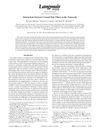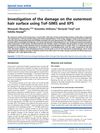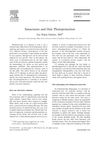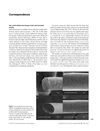 28 citations,
December 2010 in “Langmuir”
28 citations,
December 2010 in “Langmuir” Hair fibers interact through classical forces, which are influenced by treatments and products, important for hair care and other applications.
 28 citations,
December 2005 in “Journal of cosmetic dermatology”
28 citations,
December 2005 in “Journal of cosmetic dermatology” Apple procyanidin applied to the scalp may help grow hair without side effects.
 27 citations,
February 2017 in “Biomedicine & Pharmacotherapy”
27 citations,
February 2017 in “Biomedicine & Pharmacotherapy” White wax and policosanol from white wax effectively reduced hair loss and promoted hair growth in mice better than a known hair growth drug.
27 citations,
January 2015 in “International Journal of Trichology” The supplement helps improve hair growth and reduce hair shedding.
 27 citations,
September 2012 in “Dermatologic Clinics”
27 citations,
September 2012 in “Dermatologic Clinics” The document concludes that using specific tools and tests is essential for identifying the cause of hair loss and deciding on the right treatment.
 26 citations,
July 2019 in “Dermatology and Therapy”
26 citations,
July 2019 in “Dermatology and Therapy” The conclusion is that genetic testing is important for diagnosing and treating various genetic hair disorders.
26 citations,
April 2010 in “The American journal of dermatopathology/American journal of dermatopathology” Researchers created a standard system to grade hair damage using microscopic images.
26 citations,
September 2005 in “International Journal of Dermatology” Hair shape is determined by genetic, molecular, and cellular factors.
 26 citations,
January 1994 in “McGraw-Hill eBooks”
26 citations,
January 1994 in “McGraw-Hill eBooks” Many hair loss conditions can be treated.
 25 citations,
May 2020 in “Stem Cells Translational Medicine”
25 citations,
May 2020 in “Stem Cells Translational Medicine” ADSC-CE treatment safely increases hair density and thickness in androgenetic alopecia patients.
 25 citations,
May 2020 in “Progress in Organic Coatings”
25 citations,
May 2020 in “Progress in Organic Coatings” Castor oil-based polyurethanes are promising for making safe, strong-performing, eco-friendly hair-styling products.
25 citations,
May 2019 in “Cosmetics” 18-MEA and cationic surfactants can restore and maintain hair's hydrophobic nature, improving its beauty and feel.
 25 citations,
May 2019 in “Heliyon”
25 citations,
May 2019 in “Heliyon” Hair treatments cause significant structural changes, especially with excessive heat, regardless of ethnicity.
 25 citations,
August 2015 in “Journal of cosmetic dermatology”
25 citations,
August 2015 in “Journal of cosmetic dermatology” African American women report more hair issues and use different hair care practices than Caucasian women, and have different hair and scalp characteristics.
 25 citations,
September 2014 in “Dermatologic Surgery”
25 citations,
September 2014 in “Dermatologic Surgery” Hair transplants can effectively treat hair loss from CCCA in African American women if there's no inflammation.
25 citations,
January 2013 in “Colloids and surfaces. B, Biointerfaces” Hair dye colors mainly target melanin granules in black hair.
 25 citations,
December 2011 in “Surface and interface analysis”
25 citations,
December 2011 in “Surface and interface analysis” Bleaching hair causes significant damage by breaking down proteins and fatty acids.
 24 citations,
November 2007 in “Journal of Investigative Dermatology Symposium Proceedings”
24 citations,
November 2007 in “Journal of Investigative Dermatology Symposium Proceedings” Hair and scalp disorders significantly affect self-esteem, and using cosmetic products like conditioners and styling aids can improve hair health and appearance.
 24 citations,
January 2006 in “Dermatologic clinics”
24 citations,
January 2006 in “Dermatologic clinics” Hair sunscreens are important for maintaining hair's cosmetic value.
23 citations,
December 2001 in “Experimental dermatology” Soymilk can slow hair growth and make hair thinner.
 22 citations,
October 2019 in “International Journal of Nanomedicine”
22 citations,
October 2019 in “International Journal of Nanomedicine” The nanoparticles improved hair growth and enlarged hair bulbs.
 22 citations,
July 2017 in “BMC complementary and alternative medicine”
22 citations,
July 2017 in “BMC complementary and alternative medicine” Natural remedies for hair and scalp issues are still widely used in Palestine.
 22 citations,
January 2015 in “Dermatology Research and Practice”
22 citations,
January 2015 in “Dermatology Research and Practice” An extra-strength marine protein supplement helped increase hair growth and decrease hair shedding in women with thinning hair.
 22 citations,
November 2013 in “Clinical and experimental dermatology (Print)”
22 citations,
November 2013 in “Clinical and experimental dermatology (Print)” Ecklonia cava, a type of seaweed, may help hair grow.
 22 citations,
February 2002 in “Clinics in Geriatric Medicine”
22 citations,
February 2002 in “Clinics in Geriatric Medicine” Many elderly women experience unwanted facial hair and various hair loss conditions, with treatments available for each condition.
 21 citations,
March 2017 in “Skin research and technology”
21 citations,
March 2017 in “Skin research and technology” Removing external lipids from hair reduces moisture and increases strength, while removing internal lipids decreases water permeability.
 21 citations,
October 2014 in “Actas dermo-sifiliográficas/Actas dermo-sifiliográficas”
21 citations,
October 2014 in “Actas dermo-sifiliográficas/Actas dermo-sifiliográficas” Hair dyes can change hair color temporarily or permanently but may cause side effects like skin reactions and hair damage.
 21 citations,
October 2011 in “PloS one”
21 citations,
October 2011 in “PloS one” Certain molecules in hair change with age and could be used for cosmetic treatments.
 21 citations,
October 2006 in “International Journal of Dermatology”
21 citations,
October 2006 in “International Journal of Dermatology” Asian hair is stronger and more damage-resistant than Caucasian hair due to a thicker cuticle layer.
 21 citations,
July 2002 in “Clinical and Experimental Dermatology”
21 citations,
July 2002 in “Clinical and Experimental Dermatology” Hair care products don't cause hair loss if used correctly.
























